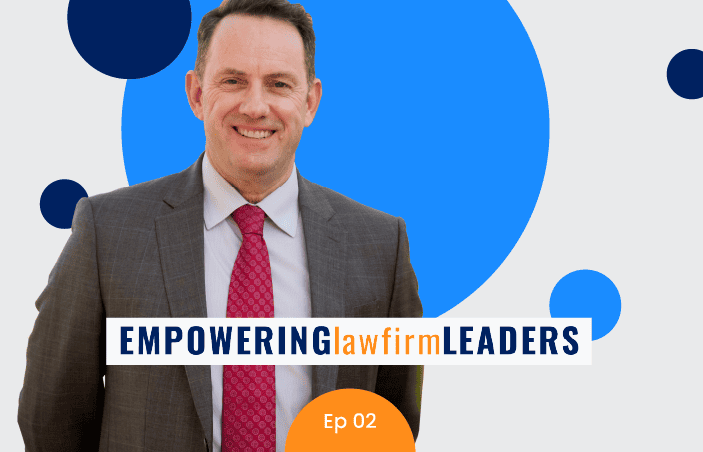Contents
How to build a high-performing law firm: Insights from a CEO
In episode 17 of the Empowering Law Firm Leaders podcast, we discuss Tina’s journey from the British Army to the helm of a prominent law firm and she offers invaluable insights into fostering a culture of trust and collaboration.
Tina Wisener, a leading UK employment lawyer and CEO of Doyle Clayton, shares her insights and secrets to building high-performing teams.
In this conversation we cover:
- Lessons learn from a law firm CEO
- How to measure success
- Secrets to building a high-performing team
- The impact of having an employee-owned trust
- Advice for aspiring law firm leaders
From the Army to employment law: Tina’s journey
Tina’s journey into law was unconventional. “I’ve been an employment lawyer for about 25 years now, but I actually didn’t qualify as a solicitor until I was in my mid-thirties,” she recalls. Her initial career in the British Army, where she specialised in HR and change management, laid the foundation for her leadership style. “I found myself at Sandhurst for Officer training, which was really a life-changing experience,” she says.
Her time in the Army taught her the importance of diverse teams and understanding different communication and decision-making styles. “If you can understand those different styles, you’re able to leverage individual strengths effectively,” Tina explains. Trust and collaboration are at the core of her leadership philosophy: “[The Army] helped me understand diverse teams and the importance of trust and collaboration,” she notes.
Tina’s transition from the Army to employment law was driven by her experiences and a desire to make a difference. “I began to really question the lawfulness and morality of certain policies in the Army,” she says. This led her to pursue a career in law, focusing on employment relationships. “Being an employment lawyer has also shaped my approach to leadership. [But] I don’t think about the lawfulness of actions; I focus on doing the right thing and being a good leader.” These principles have been instrumental in her role at Doyle Clayton.
Key lessons in law firm leadership
As a leader, Tina emphasises authenticity, communication, and a client-centric culture.
1. Authenticity
Tina stresses that, as a leader, “you have to be authentic, which means being genuine and transparent, knowing your strengths and limitations, and being honest about them.” Authenticity builds trust within the team, which is crucial for effective collaboration. “People often say to me that I’m not afraid to talk about anything with people at work. I bring my professional self to work, of course, but everyone knows about me, my family, what I do at the weekends, my career, my background,” she shares. This openness encourages others to be authentic as well, fostering a supportive and trusting environment.
2. Communication
Regular and effective communication is another cornerstone of Tina’s leadership philosophy. “Poor communication often comes up in law firm engagement surveys,” she notes. To address this, Doyle Clayton has implemented several communication strategies. Tina also makes a point of interacting directly with employees. “I walk the floor on a regular basis, so that I’m interacting directly with all employees, and I encourage my direct reports to do the same,” she says. This approach ensures that everyone in the firm feels heard and valued, which is essential for maintaining a positive and productive work environment.
3. Client-centric culture
Fostering a client-centric culture is the third key lesson Tina has learned. “If you create a firm where everyone has a focus on client satisfaction and builds strong client relationships, it goes a long way in becoming a successful law firm,” she explains. This mindset is not limited to the lawyers but extends to all employees. “It’s about creating a firm-wide mindset where everyone, from receptionists to senior partners, understands the importance of client satisfaction”.
Measuring success beyond financial metrics
For Tina, success in a law firm extends beyond traditional financial metrics such as revenue and profitability. While these are important, she believes that other factors are equally crucial in determining the overall success of the firm.
Staff retention: “Retention of our staff is a key indicator of success,” she says. At Doyle Clayton, many employees have been with the firm for over ten years, which reflects a positive and supportive work environment.
The ‘Mood Music’: “The general mood in the firm, or what I call the ‘mood music,’ is also important. You can tell a lot by the atmosphere and well-being in the firm,” she notes. The mood music encompasses the overall atmosphere, employee morale, and the sense of well-being within the firm. “I’m often told that this is the friendliest and most collaborative law firm that people have worked at,” she shares.
About the speakers

Tina Wisener is the CEO of Doyle Clayton, a leading UK employment law firm. With a background in the British Army and over 25 years of experience in employment law, Tina brings a unique perspective to leadership and innovation in the legal sector. Her commitment to trust, collaboration, and employee empowerment has been instrumental in Doyle Clayton’s success.
Employee engagement: “All law firms talk about wellbeing, but I worry it’s sometimes just another one of those tick-box exercises,” she says. At Doyle Clayton, well-being initiatives are integrated into the firm’s culture. “We have several initiatives, including regular well-being walks at lunchtime.” These initiatives provide opportunities for employees to connect, relax, and recharge, contributing to a more engaged workforce.
Recognition and empowerment: Tina highlights the importance of acknowledging employees’ contributions and providing opportunities for growth and development. “Employees don’t really care about free pizza on a Friday and fancy offices. They want recognition, empowerment, flexibility, great leadership, work-life balance, and to be heard,” she says.
The role of an employee-owned trust in firm success
Doyle Clayton is one of the few UK law firms with an employee-owned trust (EOT). “We became an EOT in 2019, which allows us to control our future and retain our identity and culture,” Tina explains. “We had several approaches to be acquired or merged, but that wasn’t something we wanted to do. We wanted to retain our identity and culture and be empowered to make decisions about our own future.”
“The majority of this firm is owned by a trust, and the employees indirectly own a stake in the firm through the trust,” Tina explains. The EOT model has empowered employees and given them a sense of ownership. “If the firm does well, the employees do well,” she notes. The sense of ownership and the firm’s commitment to transparency and employee engagement make it an attractive place to work. “It helps set us apart and helps with retention and attraction of talent.”
This structure ensures that decisions about leadership, succession planning and the firm’s direction are made with the input of the trustees: “The trust has a voice in succession planning and the next generation. It empowers employees and gives us a sense of control over our future,” Tina adds.
Six essentials of building a high-performing team
1. Transparency from leaders: Openness and transparency help build trust and highlights the impact employees have on the firm’s success: ” We share a lot of financial information… much more than other law firms do.” Along with being an employee-owned trust, this helps with accountability and empowerment.
2. Communication: Effective communication is crucial. Tina ensures that everyone in the firm understands the goals and vision. “In my first year, what I started with was making sure that everyone, no matter their role in this firm, understands what our goals and vision are,” she explains.
3. Understanding roles: Tina explains it’s important that everyone is aware of their responsibilities and how their contributions impact the firm’s success. “I try to make sure that all of our team leaders ensure that everyone in their team understands their role and, importantly, why their role is important,” she notes.
4. Shared goals and values: Creating a strong sense of identity through shared goals and values is another key strategy. “Having shared goals and values has helped us create a really strong sense of identity,” Tina says.
5. Feedback and listening: Tina explains that leaders need feedback and should actively seek it from their team. Listening to feedback helps identify areas for improvement and ensures that the team feels heard.
6. Don’t delay difficult decisions: Being a leader involves making difficult decisions and communicating them effectively. “When you encourage speaking up, be prepared to deal in an appropriate way with some of the difficult stuff,” Tina advises.
Advice for aspiring law firm leaders
Tina’s advice for aspiring law firm leaders is to be authentic, confident, and resilient. “If you’re authentic, it builds trust, and if your employees trust you, they will collaborate and work together,” she says.
As a leader you also have to be self-aware: “It’s important to be aware of your strengths and your weaknesses,” she says. And self-awareness encourages continuous learning and curiosity. “You have to learn something every day,” she says. Staying curious and open to new ideas allows leaders to adapt to changing circumstances and continuously improve their skills. “Being self-aware and curious helps you continue to learn and grow as a leader,” she notes.
Tina also stresses the importance of focusing on developing others. “Forget yourself and focus on developing others. It fosters a strong team culture and prepares the business for the future.”
Confidence and resilience are essential traits for law firm leaders. “You need to be confident, but not overly confident. If you’re communicating a decision, you need to stand by it and be confident about it,” Tina advises. Resilience is equally important, as leadership can be challenging and things don’t always go as planned. “You need to be resilient, recognise that not everything’s going to be brilliant all the time,” she says.
Authentic leadership build effective teams
Tina’s leadership style, rooted in her diverse experiences, emphasises the importance of being genuine and transparent. By openly sharing her strengths and limitations, she fosters a culture of trust and collaboration within Doyle Clayton. This authenticity not only builds strong internal teams but also enhances client relationships, as employees feel empowered to deliver exceptional service.
Regular updates, open dialogues, and active listening ensure that everyone understands their role and the firm’s goals. This clarity and alignment are crucial for maintaining high performance and achieving long-term success. Building effective teams requires more than just strategic vision. It demands a genuine commitment to transparency, communication, and empowerment.
Watch the full interview with Tina Wisener now to discover more advice and guidance on running a successful law firm. You’ll also hear Tina’s exclusive insights into future innovations at Doyle Clayton and further advice for building effective teams.




